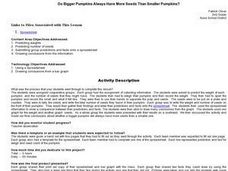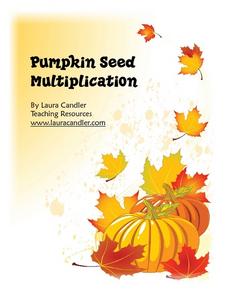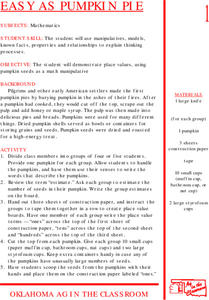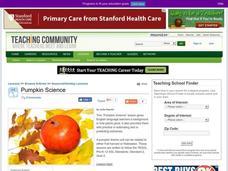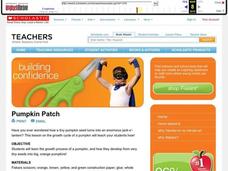Education World
Predicting Pumpkins
If you want more pumpkin seeds, you should get a bigger pumpkin—right? Young harvesters use estimation skills to make a hypothesis about how many seeds they will find in a pumpkin before examining the real number inside.
AtoZ Teacher Stuff
Pumpkin Life Cycle
From seed to jack-o-lantern, young scholars walk step-by-step through the life cycle of pumpkins with this fun art and science activity. After first participating in a shared reading of the children's book Pumpkin,...
Agriculture in the Classroom
Pumpkins... Not Just For Halloween
Celebrate fall with four pumpkin themed hands-on activities! After learning about pumpkins, scholars complete two activity sheets that reinforce estimation and word problems. They then plant pumpkin seeds and bake a pie in...
Curated OER
Planting Pumpkins
Students plant pumpkins. For this agriculture lesson, students use pumpkin seeds, mulch, and shovels to plant seeds from a pumpkin. Students observe the changes during each season.
Curated OER
Life Cycle of the Plant - The Pumpkin
First graders access prior knowledge about pumpkins and read the story Pumpkin, Pumpkin. They will sequence the life cycle of the pumpkin through the use of picture cards and then sing a song about the life cycle of the pumpkin and plant...
Curated OER
Pumpkin Time
Students visit a pumpkin farm and discuss the characteristics of a pumpkin and how they grow. They create a class story about the trip to the farm with each student supplying a sequence for the story.
Curated OER
Pumpkin Potpourri
Students explore pumpkins through numerous hands-on activities. They read the book, "Pumpkin, Pumpkin." Students create a story wheel. They illustrate sections of the book. Students design a mural, create a paper pumpkin patch, and write...
California Education Partners
From Seed to Pumpkin by Wendy Pfeffer
Conduct a lesson that leads into a writing assessment. After reading an excerpt from From Seed to Pumpkin, first graders demonstrate their interpretation of sections of the passage by sketching the details from each part.
Curated OER
Pumpkins-Life Cycle of a Plant
In this lesson, Pumpkins-Life Cycle of a Plant, students study the life cycle of a pumpkin. Students will analyze the pumpkin and how it goes from seed to pumpkin over a three days of activities. Students sing a song teaching them about...
Curated OER
Pumpkin Seed Data!
Second graders work with pumpkins to estimate, then accumulate data about pumpkin seeds. After cleaning out the pumpkins, 2nd graders utilize a worksheet imbedded in this plan which has a variety of pumpkin math activities they can do.
Curated OER
Do Bigger Pumpkins Always Have More Seeds Than Smaller Pumpkins?
Second graders, in groups, predict the weight of a pumpkin and the number of seeds it might have. Then they find and record the actual weight and actual number of seeds. They compare and contrast the size of the pumpkin to the number of...
Curated OER
Estimate How Many Seeds Are In a Fruit or Vegetable
Help mathematicians estimate how many seeds are in a given vegetable or fruit. They are divided into pairs and estimate the amount of seeds in a whole fruit without seeing the inside. They then cut the fruit or vegetable in half and...
Curated OER
Pumpkin Investigation
Students examine pumpkins and make a book depicting and describing the inside and outside of a pumpkin.
Curated OER
Pumpkins . . . Not Just Part of Halloween
Students study the pumpkin. In this pumpkin lesson, students participate in different activities that explain the history of pumpkins and how pumpkins develop and grow, read "The Great Pumpkin Story" and answer comprehensive questions...
Curated OER
Observing the Pumpkin Cycle
Students observe and listen to nonfiction books about the life cycle of pumpkins. They practice early reading skills in a shared reading related to pumpkins. They observe the life cycle of a pumpkin including growth and decay.
Curated OER
Pump Up the Curriculum With Pumpkins!
Students complete a variety of activities as they examine "pumpkins."
Curated OER
Apples and Pumpkins
Students complete a variety of activities related to the book "Apples and Pumpkins." They listen to the book, generate a list of words starting with P, taste foods made from apples, and sequence the events from the book. Students then...
Curated OER
Pumpkin Seed Experiment
In this unique lesson young scholars participate in a pumpkin seed experiment. Students interact with the pumpkins weight, seeds and record their findings of what lies within the pumpkin once the top of the pumpkin is cut off for...
Curated OER
Pumpkin Seed Multiplication
Learners practice multiplication facts. In this multiplication lesson plan, students participate in a pumpkin seed multiplication game where they match up addition sentences and multiplication facts. Game board and number sentences are...
Curated OER
EASY AS PUMPKIN PIE
Learners demonstrate place values using pumpkin seeds as a math manipulative. They use manipulatives, models, known facts, properties and relationships to explain thinking processes. They estimate the number of seeds in their pumpkin.
Curated OER
Pumpkin Science
Students investigate how plants grow by analyzing pumpkins. In this agricultural lesson, students read The Biggest Pumpkin Ever by Steven Kroll, and draw pictures of a pumpkin in each of its growing stages. Students measure and dissect...
Curated OER
Pumpkin Exploring
Students use their senses to explore the make up of a pumpkin. In this senses and observation lesson, students cut off the top of a pumpkin, reach their hands inside the pumpkin, discuss the different senses they are experiencing,...
Curated OER
Pumpkin Patch
Students create a pumpkin art project that outlines the life cycle of a pumpkin in order to learn the growth process of this particular vegetable. In this pumpkin art lesson, students first review the life cycle of a pumpkin as a class,...
Curated OER
Ranger Rick: Dissect a Pumpkin
In this pumpkin activity worksheet, students examine pumpkins inside and out and then respond to 4 short answer questions regarding their observations.












